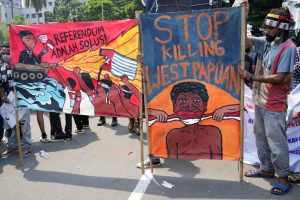Indonesia’s newly appointed military chief has played down the seriousness of the situation in Papua, after several years of worsening conflict in the restive eastern region. According to a report by BenarNews, Adm. Yudo Margono, who was sworn into his position on Monday, was responding to a question from a reporter about whether the increase in violent attacks over the past few years had reached the level of an emergency.
“Not yet. I don’t think it has reached that level,” he said. “So far it remains a criminal law enforcement issue, so Indonesian police are in charge, but we are helping law enforcement.”
The questioner referenced an incident on Monday in which police fired on villagers who had attacked a police station in Tolikara regency, in the newly formed Papua Highlands province, with “sharp weapons and arrows,” as CNN Indonesia reported. In the incident, one resident was reportedly shot dead and another eight were injured.
The incident reflected the growing level of violence in the two provinces of Indonesian Papua, which is home to a long-running separatist insurgency.
Yudo’s comments came a day after President Joko “Jokowi” Widodo announced that he supports plans to reduce the troop presence in Papua – though not a softening of the government’s policy there. According to Reuters, the Indonesian leader said that “the reduction of military troops in Papua is good, but we need to continue to be stern.” Otherwise, he said, armed rebel groups will always continue to operate there and “the problem will never end.”
While the Papuan independence movement dates back to Indonesia’s annexation of the former Dutch colony in 1963, the situation has worsened considerably since 2018, when guerilla fighters of the West Papua National Liberation Army killed 16 laborers working on the Trans-Papua Highway. Jakarta responded to the attack by deploying thousands of troops to the region. The ensuing conflict has resulted in deaths on both sides, dozens of arrests, and the mass displacement of Papuan villagers caught in the middle of the conflict.
According to a recent report from the Jakarta-based Institute for Policy Analysis of Conflict, the frequency of violent insurgency-related attacks has increased from an average of 11 incidents per year between 2010 to 2017 to 52 incidents per year during 2018-2021. In November 2020, the United Nations said that there had been “repeated reports of extra-judicial killings, excessive use of force, arrest and continuous harassment and intimidation of protesters and human rights defenders” since 2018.
The situation has worsened further since April 2021, after Papuan separatist rebels ambushed and assassinated Brig. Gen. Gusti Putu Danny Nugraha, the head of Indonesia’s intelligence agency in the eastern province. The assassination led the government to formally designate Papuan separatists as “terrorists” and deployed further troops to remote parts of Papua and West Papua provinces.
It is tempting to view Jokowi’s comments about a possible reduction in the Indonesian troop presence in Papua and West Papua as a step toward a more humane and effective policy – and an admission that the hard line toward the region has failed. But the Indonesian leader’s continuing call for a “stern” policy almost guarantees that no matter the exact number of deployed troops, his administration will continue to lean into the spiral of conflict that has engulfed the region since 2018.
































